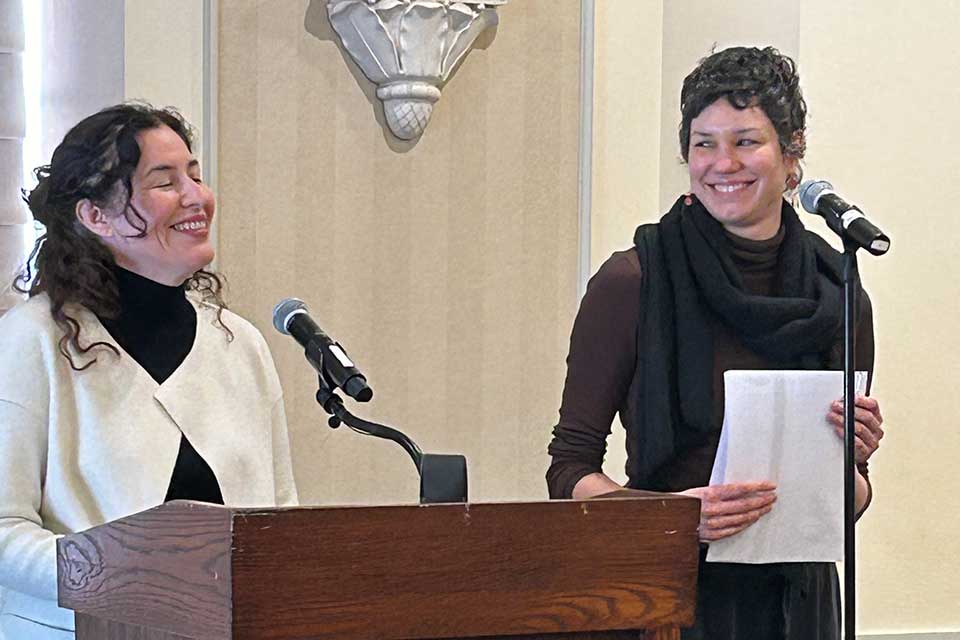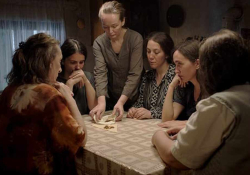Translating Guadalupe Nettel: El texto tomado

Rosalind Harvey presented an earlier version of this essay at the 2025 Puterbaugh Lit Fest honoring Puterbaugh Fellow Guadalupe Nettel. As Nettel’s principal English-language translator, Harvey shared insights from her translation of Nettel’s work, including how ambiguity makes readers active agents in meaning creation and the feature of doubling—of one thing containing, if you look closely and courageously enough, something else.
“I’ve always liked stories about doubles; the kind where an Alien bursts out of someone’s stomach or a Siamese twin grows behind their back. As a child I adored the cartoon where the coyote unzips his ferocious hide and is transformed into a meek little lamb. I knew that inside me, too, there lived a thing without imaginable form, that played when I played, ate when I ate, was a little girl while I was. I was sure that one day The Thing would show itself, give signs of life and, although I found the idea terrifying, I never stopped searching for these signs in the passages of my daily life, as other people trawl their faces for blackheads or their scalps for crusts of grease. . . .
Once, The Thing had a name, and I knew it as easily as I knew those of my cousins or aunts and uncles, but now I am incapable of recalling it. I remember it was one of those traditional names with lots of character like Consuelo, Soledad, Victoria, Constanza. There are words that, in the swell of conversation, bring me the sound of that intangible noun, but something inside me rejects it. Sometimes I wonder why, if I always remember my own name, Ana, so simple, so ordinary, I don’t remember that other name I carry inside myself.”
This passage is from the opening of Guadalupe Nettel’s first novel, El huésped (“The Guest” or “The Host,” but we’ll come back to that word’s tricksy double meaning later). In common with her collection of short stories Bezoar and Other Unsettling Stories, El huésped reveals a disparate group of marginal characters whose unifying element is their supposed abnormality: the blind, the deformed, the out-of-place, and the mad. The protagonist, Ana, is a solitary, nervous girl who lives with a parasite, an unnamed, intangible being that she calls simply La Cosa (The Thing). The Thing is never wholly defined, raising numerous questions for the reader—is it an actual possession, demonic or otherwise, some kind of mental illness, or simply an unexplored, shadow part of Ana, a part she does not want, or is too afraid, to acknowledge?
The section from El huésped above was translated in 2008 as part of my master’s dissertation, and so I’ve been thinking about Guadalupe’s work since then. This first novel of hers could happily be read alongside several classics from the Western canon of fantastic literature—sharing genes with Poe’s story “William Wilson” and Maupassant’s “Le horla,” as well as with fellow Mexican Carlos Fuentes’s celebrated tale Aura—but as a budding translator and a student of translation studies, I was drawn mainly to the way her work seemed to call out to be translated and how, in this particular book, the theme itself functioned as a highly generative metaphor for the translator’s work. Her writing displays a deceptively calm, limpid surface, like that of a still pond; there is an economical use of adjectives and a resulting feeling that here is a storyteller who doesn’t need to hurry, plus a subtle undercurrent—particularly present, I think, in her stories—of something that lies just beneath that surface, something less like a fish in this still pond and more like an eel: difficult to grasp, ever so slightly sinister, yet always compelling.
Just as its protagonist, Ana, contains within her The Thing, which is not as separate from her as she might like to think, my argument drew on Walter Benjamin’s idea of translation as being the afterlife of a text, and on Borges’s view of the practice involving “a powerful literary mind able to see the latencies and potentialities of a text.” Translation is about sensing these latencies, this double-ness, if you like, and drawing them out, in order to extend the life of the text and to open it up to new readings, new dialogues. All great texts contain within themselves their translations, or at least the seeds thereof, translations that are not as separate from the original texts as we might like to think—they are in intimate relation with each other, just as Ana is with La Cosa in El huésped. In that sense the book was a gift because it allowed me to explore this doubling via the act of translating a section of it for the dissertation, while also using its themes as a powerful lens to look at what translation does when it does its task well.
All great texts contain within themselves their translations, or at least the seeds thereof, translations that are not as separate from the original texts as we might like to think.
An example. The ambiguous nature of Ana’s parasite and of whether she is merely imagining her possession is signaled by the word huésped in the novel’s title. The word has its roots in the Latin hospes, which means both “host” and “guest,” and the Spanish retains these two conflicting meanings, mirroring Ana’s, or The Thing’s, status as a double. Ana’s “temor acerca de que reconocieran al huésped” (fear that the guest/host would be recognized) stems from the terrifying thought that someone might recognize she is inhabited by a stranger, but equally that they might confuse the stranger with her, believe that it is her, and thus recognize her true identity. The title, then, contains two meanings within it: to the Spanish-speaking reader, it hints at Ana’s transformation of herself; to the translator, it hints at the translation of the novel itself. The dual meaning of the word in Spanish reflects the ambiguity of the very concept of the double—rather than a separate entity, it is an integral part of its original, whether that be a person or a text. It is slippery, an eel in the pond.
The translator into English must choose between these two words, guest and host, resolving the ambiguity inherent in the Spanish, which is obviously a risk—part of the beauty of Guadalupe’s title (part of how literature in general works) is via such ambiguity, because this undecidability nudges readers toward becoming an active agent in the creation of meaning. The English “guest” comes from Middle English via Old Norse gestr, from an Indo-European root shared by the Latin hostis (“enemy,” originally “stranger”). “Host,” meanwhile, has three meanings. The first, someone who looks after a guest in their own home, comes from the Latin hospes (as does huésped), and this Latin hospes means both “host” and “guest.” The second meaning, referring to a large number of people or things, comes from the Latin hostis, “stranger” or “enemy,” as before. The third meaning, the bread consecrated in the Eucharist and representing the body of Christ, comes from the Latin hostia, “victim.” In my unpublished translation, I opted for “host” for the title of the novel, thinking about how the root, hospes, means both “host” and “guest”; the word “host” has positive connotations (e.g., the jovial host of a party) but also rather sinister ones of someone carrying a parasite. “Host” also retains an echo of the root of its second meaning, the Latin hostis, an echo that suggests another cognate, “hostile”; I hoped this meant that at least some of the original’s doubleness was reflected in the English translation.
However, the word appears several times throughout the novel, and it is not always obvious that “host” is the best translation. Early on in the novel, Ana wonders what would have happened had she ever met another little girl with a similar possession to hers: “Me pregunto qué habría pasado si una de esas mañanas me hubiera encontrado frente a alguien así, o peor aún, frente a su propia huésped” (I wonder what would have happened if one morning I had found myself faced with someone like that, or worse still, with their own guest/host). The “someone like that” in this sentence refers to the imagined girl but could conceivably refer to this other girl’s parasite, and it is somewhat ambiguous whether Ana feels that it would be worse to be confronted with the parasite or its host. This huésped I translated as “inner guest,” which in Spanish would be huésped interno, which is how The Thing is described by Ana on another occasion.
We talk a lot about loss in translation, and it is true that the slight ambiguity of the Spanish word in this precise instance is lost; and yet, if the words “guest” and “host” are both used throughout the translation where the original only has huésped, this word is hopefully allowed to develop, to let its two inner meanings bloom forth alternately. The reader of the translation cannot choose between conflicting meanings contained within a single word as in the Spanish, yet she is confronted with the unsettling concept of a malevolent guest, a word that, in contemporary English, has primarily positive connotations. The phonic closeness of “guest” to “ghost” is another fortuitous translational development that might give an uncanny echo not present in the original.
Here is a more recent example. The following phrase is the opening line of a story from Nettel’s new collection, The Accidentals:
La infancia no acaba de una vez, como nosotros queríamos cuando éramos niños.
A literal translation might read:
Childhood does not end once and for all / all at once as we wanted [it to] when we were children.
De una vez literally means “of one time,” but it’s a set phrase that we rarely translate these word-for-word. My first draft read: “Childhood does not end suddenly / all at once / once and for all / suddenly / definitively as we wished it would when we were children.” There’s nothing wrong with any of these possible translations; they all work, more or less. But then in my online dictionary explorations, I come across this great phrase: “in one fell swoop.”
Aside from the fact that I’m a sucker for an idiomatic phrase with a nice visual element, I think that maybe I can use this because it speaks to a central element in this piece of writing. The sentence starting “Childhood does not end . . .” is the opening line of a story that involves an albatross: the narrator witnesses one of these giant birds with the world’s largest wingspan crash-land onto a boat she is on, before eventually taking flight, at first clumsily, then full of grace, leaving everyone onboard in awestruck silence. In the rest of the story, she laments that her longtime childhood friend and recent lover has decided to move back to Uruguay after having spent his entire adult life in Mexico, struggling to understand how he can feel his home is elsewhere. Uruguay, which he left as a child during the dictatorship, retains a pull on him, just as the albatross is pulled by its instincts to make astonishingly lengthy migrations, and his choice to leave is a painful reminder for the narrator that the connection she felt to him in childhood is not as strong as the imagined connection he has with his homeland.
This phrase, “one fell swoop,” is suggestive of broad wings grazing the surface of the boat’s deck or an ice-cream-white gull swooping down to steal your fries.
So, this phrase, “one fell swoop,” is suggestive of broad wings grazing the surface of the boat’s deck or an ice-cream-white gull swooping down to steal your fries. It is birdlike. It could be a description of the albatross in the story suddenly being lifted up by the currents of wind above the boat and soaring over the protagonists’ heads. It fits, to my mind, entirely with the context. The continuation of that opening paragraph also contains brilliant imagery in which childhood itself is personified, made extremely creepy, given human characteristics:
Childhood does not end in one fell swoop, as we wished it would when we were children. It remains there, crouching silently in our mature, then later wizened bodies, until one fine day, after many years, when we believe that the heavy burden of bitterness and despair we carry has turned us irredeemably into adults, it reappears with the force and speed of a lightning bolt, wounding us with its freshness, its innocence, its unerring dose of naïveté, but mostly with the certainty that this really and truly is the last glimpse we will have of it.
This imagery makes it feel possible to translate this seemingly ordinary phrase, de una vez, by way of a phrase in English that has movement, that suggests a creature, a living thing with agency: one fell swoop. It fits with the tone of the passage, and with the sense that it is not only people but also objects and concepts, that can have an agency of their own. Childhood itself as a living thing, crouching inside all of us, separate, in a way, from us and yet the same, just like a double—what a powerful image! This is a recurring theme in Guadalupe’s writing; many of her stories, including “Playing with Fire” and “A Forest under the Earth,” both from the new collection The Accidentals, and also her novels, including El huésped, are shot through with a powerful sense of the uncanny, the not-quite-seen. The title of this piece, “El texto tomado,” comes partly from the synergies I felt between her work and Julio Cortázar’s well-known short story “La casa tomada” (House Taken Over), in which a house is slowly overtaken by an unknown entity and the natural laws governing the world start to seem to break down. But I want el texto tomado to also refer to the idea of a text containing something other than what we see on the surface, containing both the seeds of its own translation, as any great work of literature does, and also certain themes we might find challenging to look at head-on.
The title of Guadalupe’s most recent novel also encapsulates this idea of un texto tomado. In the Spanish, La hija única can mean both “the only child,” specifically a female child in this case, and also “the unique daughter,” referring to Inés, the baby in the story, who is born with certain developmental disabilities and yet who, despite all the difficulties this entails, is forcefully loved and fought for by her parents, in a narrative that shows us what taking care of each other means in all its complexities. To re-create the wordplay of the title in English, we went through several different iterations. I hope Guadalupe won’t mind me saying that she and I had what you might describe as a heated discussion about the translation, including, at one point, the title: she was concerned that it was perhaps too strong, too blunt or upsetting when compared to her title, and it’s certainly true that it isn’t quite as subtle as the Spanish. What it does do, and what I am glad that both Tamara and Jacques at Fitzcarraldo managed to articulate persuasively so that everyone involved ultimately felt comfortable with the title, is to dynamically re-create the wordplay of her brilliant Spanish title via that almost imperceptible gap in between the words “Still” and “Born,” to re-create something of the way that the first thing you see on the front cover as a potential reader is this very feature that so much of Guadalupe’s writing contains, both on a textual, wordplay level, and on a broader thematic level: this feature of doubling, of one thing containing, if you look closely and courageously enough, something else; something that is not, perhaps, as easy to stomach as the first, and yet which encapsulates our humanity honestly and empathetically.
Coventry, UK
Editorial note: A portion of this text was first published in Words Without Borders.










